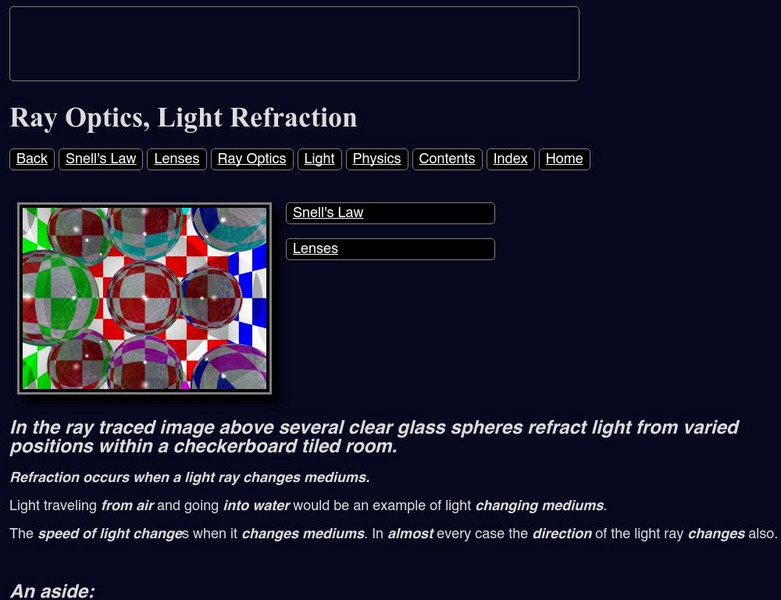Hi, what do you want to do?
Curated OER
Light
All aspects of the path of light are included in a great summary. Internal reflection and the angles of paths in different materials are explained and the behavior of visible light through lenses and the effect on focal points are...
Curated OER
Light and Optics
In this light and optics worksheet, 11th graders fill in 7 blanks about the nature of light, draw 9 diagrams to illustrate reflection, refraction, lenses and color.
Curated OER
Light and Geometric Optics
It's time to see the light with a unit that focuses on light and geometric optics, including concave and convex mirrors. A variety of experiments, worksheets, and online activities are included.
Physics Classroom
A Critical Lab
Physics lab groups finagle with laser lights to determine the critical angle of refraction for both water and Lucite. Because there are no detailed steps or an answer key for this enlightening exercise, an inexperienced physics...
Exploratorium
Water Sphere Lens
With a Florence flask or fishbowl, make a double convex lens and use it to examine an image. Because of the refraction, the image will be inverted. A simple explanation is provided here for you to share with your class as they...
Curated OER
Physics 152 Fall 2004 Final Exam, Parts A, B, C, D
At the end of a general physics course focused on light and electricity, you can administer this exam. Concepts covered include electromagnetism, circuits, induction, light rays, lenses and mirrors, characteristics of light, electron...
NASA
Collecting Electromagnetic Radiation
Astronomy is literally over your head, but this lesson will explain how we study it. Young scientists make telescopes, calculate and compare the light gathering power of lenses, and simulate detection of infared radiation....
Curated OER
Reflection, Refraction & Lenses
Students are able to describe what happens to light when it strikes different materials. They describe the law of reflection. Students are able to explain why a mirror froms a virtual image. They are able to describe diffuse reflection.
Curated OER
Focusing on Lenses
Students explore scientific observations by examining the parts of a microscope. In this optics lesson, students discuss the importance of a focal point and focal distance when utilizing an optical device such as a microscope. Students...
Curated OER
Microscopes and Telescopes
Students analyze a microscope and study what they do. For this investigative lesson students study how microscopes were first invented, and how ray diagrams are used in conjunction.
Curated OER
Making a Periscope
Students experiment with a simple periscope to see how it reflects light. They draw a diagram of the path a ray of light follows as it travels from an object, through the periscope, and into your eye.
Curated OER
A View of the Cell
In this viewing of a cell worksheet, students will read a paragraph about how microscopes work and will use a diagram of a light microscope to complete 2 short answer questions.
Curated OER
Pinhole Viewer
Students make a pinhole viewer to demonstrate how it inverts light passing through it which produces inverted images.
Curated OER
Reflection & Refraction
In this online interactive reflection and refraction worksheet, students respond to 7 multiple choice and fill in the blank questions regarding the information included in the provided paragraphs.
Curated OER
Cloud Shadows
Students classify the visual opacity of various materials, what is needed to create shadows, and classify clouds by the types of shadows that they produce.
Curated OER
Ray Optics, Light Refraction
Site studies light refraction and provides illustrations several illustration. Contains links to Snell's Law, lenses, ray optics, light and much more.
Physics Classroom
The Physics Classroom: Refraction and the Ray Model of Light: Diverging Lenses
In this illustrated tutorial, students will see a specific method for constructing ray diagrams for double concave lenses.
Physics Classroom
The Physics Classroom: Refraction and the Ray Model of Light
Six complete lessons on refraction and the ray model of light. Tutorials include informational text, interactive activities, animations, and quick, interactive comprehension checks along the way.
Physics Classroom
The Physics Classroom: Refraction and the Ray Model of Light: Converging Lenses
An illustrated tutorial which takes students step-by-step through the process of drawing ray diagrams.
Physics Classroom
The Physics Classroom: Refraction and the Ray Model of Light: Anatomy of a Lens
Illustrated diagrams in this tutorial help students understand the properties and functions of lenses.
Exploratorium
Exploratorium: Water Sphere Lens
A discussion of how to make a magnifying lens exhibit using a water-filled flask and a light bulb. Consists of assembly instructions and a "To do and notice" section. Great for a teacher demonstration or a student project.





















